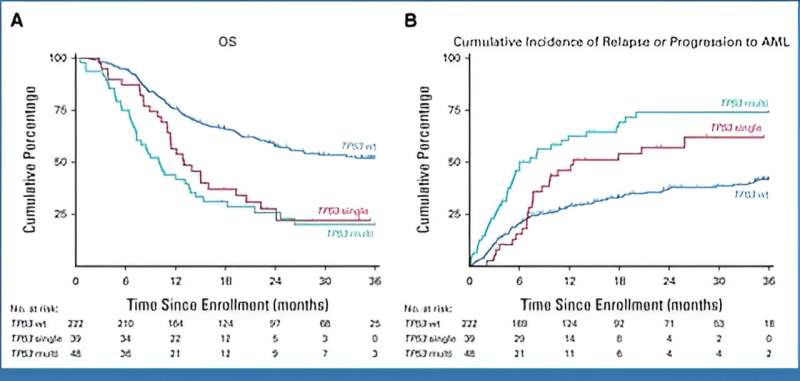This article has been reviewed according to Science X's editorial process and policies. Editors have highlighted the following attributes while ensuring the content's credibility:
fact-checked
peer-reviewed publication
trusted source
proofread
Allogenic hematopoietic cell transplant a viable option for high-risk myelodysplastic syndrome, study suggests

Evidence suggests that allogenic hematopoietic cell transplantation (HCT) improves overall survival in patients with myelodysplastic syndrome (MDS), a serious blood disorder, when compared with best available supportive care. But MDS is a heterogeneous disease and questions remained about how cancer-related genetic mutations influence outcomes.
This study, led by Dana-Farber researcher R. Coleman Lindsley, MD, Ph.D., used DNA sequencing to evaluate samples from a large clinical study of HCT in older parents with MDS led by Corey Cutler, MD, MPH. The findings are published in the Journal of Clinical Oncology.
The researchers integrated the genetic and clinical characteristics of each patient in their analysis. They determined that patients had the potential to benefit from HCT regardless of their genetic mutations. Approximately one in four patients with TP53 gene mutations, those at the highest risk of poor outcomes, were still living three years after HCT, while none were alive without HCT.
Oncologists have debated the value of HCT for patients with high-risk MDS with TP53 mutations. Outcomes for these patients have historically been so poor that some have wondered whether HCT might be a futile procedure. This study indicates that HCT should be considered a potential curative treatment option for all MDS patients, even those with highest risk TP53 mutations.
More information: Jurjen Versluis et al, Allogeneic Hematopoietic Cell Transplantation Improves Outcome in Myelodysplastic Syndrome Across High-Risk Genetic Subgroups: Genetic Analysis of the Blood and Marrow Transplant Clinical Trials Network 1102 Study, Journal of Clinical Oncology (2023). DOI: 10.1200/JCO.23.00866



















